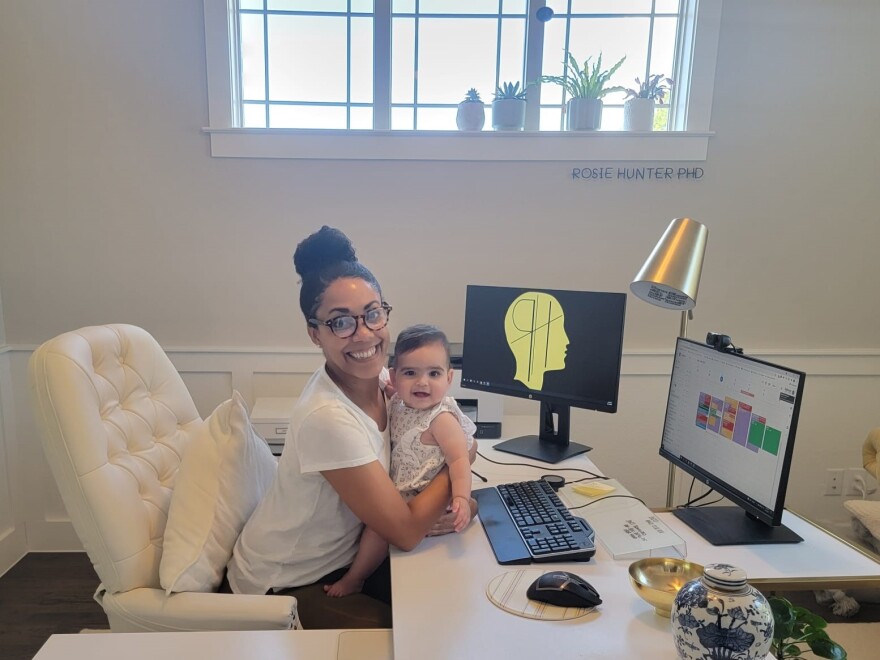The Centers for Disease Control and Prevention reports that pandemics often lead to increased mental health issues. Rosie Hunter, a licensed clinical psychologist based in Dallas, said she’s seen an uptick in the number of patients requesting support since March 2020.
“There was a spike in people who were interested in therapy, because it was all of a sudden very uncertain,” Hunter said. “I've been talking with people who are in their homes and struggling with anxiety, and a lot of it's pandemic-related.”
Hunter said she and her patients hit a groove for a while where people were “promising themselves that there was light at the end of the tunnel,” but with the more contagious delta variant spreading across the state, “the light that we thought we saw is a little further off.”
Hunter said there are some helpful ways to navigate this season, even as so much is still up in the air.
Check In With Tough Feelings
One of Hunter’s suggestions for people struggling with the indefinite nature of a pandemic is to set time limits when feeling overwhelmed.
“If they start to not like the way that they feel, if they feel too angry, if they feel too left out, if they feel too lonely, too busy, to decide that, OK, this is a pivot point,” Hunter said.
She recommends people ask the question, “What do I want to carry with me to whatever the next phase is?” That could include reaching out to people or trying a new hobby.
She said being intentional about observing the way people are framing their experiences in the pandemic is a key part of cognitive behavioral therapy, which is often used in treatment for people with anxiety or depression.
“It asks you to gain some distance and look at your thoughts,” Hunter said. “If your thoughts are about how this has been going on so long, and that you can no longer sustain it ... all of that implies that those resources are finite. So you have to ask yourself, what's the story I'm telling myself about time? And can I adjust it?”
Make A Point To Cultivate Joy
Hunter said one way to get energized is by “sprinkling some fun” into daily tasks. She encourages people to make a list of what brings them joy, and take 15 minutes a couple of times a week to do those things.
“If once upon a time you'd like to dance to music in your living room, it'll probably work [now],” Hunter said. “Reviewing just the kinds of things that you used to do, when you felt very happy, and doing them to elicit the feeling.”
She also recommends journaling as a way to gain perspective.
“When we write things down, we inherently are thinking about our future selves reading it, or someone else reading it, which gets us out of that space where we're too close to our thoughts and our fears,” Hunter said. “So just by creating it, you're acknowledging to yourself this is crazy, right? This is a wild time. But you're also speaking to a future and reminding yourself that there is going to be one out there where you're reflecting on this at some point.”
Have Honest Conversations With Friends & Family
But when the pandemic feels overwhelming and fatiguing, Hunter said it’s important to share that with others.
“One of the things that you can do to recognize that you're not alone, and build your confidence for dealing with it, is just to have a conversation,” Hunter said.
She said reaching out can remind people of what they’ve survived over the past year-plus.
“It will empower you to be more confident that you can make it through however much is left.”
She also described things to look out for in friends and family, like feelings of hopelessness or expressions of feeling like a burden.
“That's a red flag,” Hunter said. “You want to make sure that that person could get connected to some kind of care, or you give them a little bit of extra time to talk through that, and know that their existence is appreciated and of value.”
Reach Out To A Therapist
If overwhelming feelings of anxiety, depression or hopelessness keep coming up, Hunter said to connect with a therapist.
“I feel like this time period is really a revolution in mental health,” Hunter said. “I am glad to be a part of that and to be available to people who are going through something truly disorienting.”
Hunter said the options for telehealth expanded during the pandemic, and she can offer therapy to clients in 27 states, whereas before she was only licensed for Texas and Virginia.
Some ways to get connected to mental health professionals are looking through databases on Psychology Today and Therapy for Black Girls for local providers, and finding telehealth options through online platforms like BetterHelp.
“Once I got well trained, especially in the context of anxiety conditions, there are things that people can do to feel better, and there's an infinite amount of people,” Hunter said. “Every time I have a patient I've been working with for a while, who suddenly gets it and can not just survive anxiety, but thrive, then that makes me very satisfied. I just truly love turning on my computer and going around to the hearts and minds of all these different people every day.”
If you are in crisis or are looking for mental health services for you or someone you know, call the Texas Department of Health and Human Services at 855-937-2372. You can also text the national Crisis Text Line by messaging "TX" to 741741 for free, 24/7 crisis support.
Got a tip? Email Elena Rivera at erivera@kera.org. You can follow Elena on Twitter @elenaiswriting.
KERA News is made possible through the generosity of our members. If you find this reporting valuable, consider making a tax-deductible gift today. Thank you.






